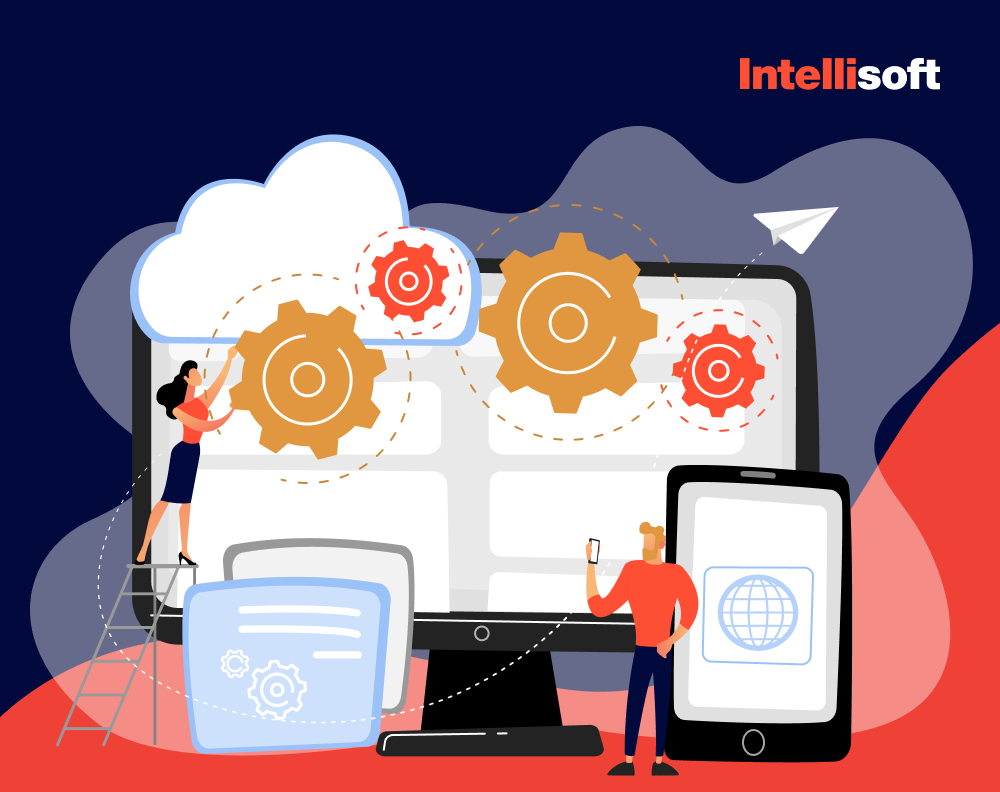Hire Experienced Web Developers
When choosing between two candidates with the same professional (hard) skills, one will choose to favor the candidate who also has good soft skills. It is more advantageous to recruit someone who can take responsibility, likes to take the initiative, leads the process, is able to communicate with the team, and manages time well.
IntelliSoft has qualified engineers on board. We take care of the entire hiring process and test every applicant’s technical and soft skills. By choosing our software development outsourcing services, you guarantee excellent app projects.
So, what are soft skills? Why is it critical to gain and develop them? We have picked the essential skills for you to make the hiring process much easier.
Table of Contents
11 Top Soft Skills for Software Developers
If a developer is an incredible technical specialist, but their time management, team communication, and self-regulation skills are poor, there is a high probability that an organization will prefer another applicant.
Tech and soft skills are equally important. What’s the difference between soft skills and hard skills? The methods of acquisition and job application are the primary distinctions between hard and soft skills. In most cases, one has to acquire hard skills through formal schooling or training. Skillsets encompass knowledge about how to use a device or piece of software. Now, let’s check the list of soft skills.
Time management
Often you hear someone saying, “I don’t have time” or “I have no time to do this.” In fact, the question is always about priorities, and everyone has their own. If you want time to study, develop, work effectively, relax, do hobbies, and meet with friends, you can’t do without time management. For a programmer, this skill is essential.
It is vital that, from time to time, a qualified software developer can change these priorities to be flexible. If they need to change their priorities one day to achieve goals, they have to do it.
There are two essential tools in time management – a compass and a watch. Understanding where you are going is more critical than how fast. When developers know where they are going, they can apply various techniques to account for and optimize time. Programmers should learn to track time and analyze what it takes them to do.
Developers should:
- Keep all tasks in one place. Today we get information everywhere – mail, messenger, calls, verbal channels, etc. This variety may make it difficult to work, so keeping everything in one place – a laptop or a mobile app is essential.
- Break down large tasks into smaller ones. The human brain perceives big (high-volume) jobs as challenging because it doesn’t know where to start. It may lead to procrastination. Specialists put off the task over and over again until the deadline comes.
- Set priorities. Plan in which order to complete the assignments after you break a big task into smaller ones.
Emotional intelligence
The first aspect of emotional intelligence is understanding the feelings and emotions of others. There are many people around us, and they are all different: calm, aggressive, moody, cheerful, etc. You need to understand who they are, what they want, and what they are afraid of. It’s much easier to communicate if you understand their feelings and motivations and know how to interact with them.
The second side of emotional intelligence is knowing how to manage emotions. Understanding and controlling our emotions makes us more likely to make informed and balanced decisions. We often take spontaneous actions under the influence of emotions, such as anger or impatience.
Engineers should not be toxic. They should not criticize or complain, especially publicly, because such actions are destructive – they do not benefit others, they do not create value but only worsen the mood and the microclimate in the team. Experts recommend reading the Harvard Business Review book ‘Emotional Intelligence’.
Negotiation
Once software developers create an application development plan, they can use negotiation tactics to align their interests with those of their stakeholders and customers.
For example, customers may have certain expectations, and organizational leaders may only allocate specific resources to complete the project. Developers can negotiate a more expansive budget with senior management, or a less stringent timeline with clients to ensure their work satisfies all parties involved.
Accountability
Admitting fault is the essence of accountability. Acknowledging that a specialist’s choice led to a negative outcome isn’t easy, but it will benefit them and your company in the long run.
A developer, or one of your coworkers, will likely repeat an error if they try to cover it up.
Teamwork
No matter how good a developer is, there are tasks and projects that they can’t handle alone without spending a lot of time. Some projects involve 100 to 1,000 people or even more because the project is large-scale and impossible to do with fewer people. Each person has a unique set of skills, and only by bringing such people together, a team can get a remarkable result.
All available forms of communication are used – messengers, correspondence, audio and video calls, and screen sharing. A developer will mainly interact with managers, analysts, and testers in their work. The more coordinated the communication, the more influential the whole team’s work because sometimes the fate of the release depends on the ability to agree. This claim is especially valid for distributed teams whose developers operate remotely.
Patience
The software development process can be long and complex, so developers need to be patient. Patience can help developers maintain their level of productivity and continue to produce quality work. It can also be necessary for interpersonal relationships in the workplace.
Working with other team members, software developers can exercise patience when, for example, training new personnel. This activity includes time management and the ability to prioritize.
When several projects are going on at the same time, it is necessary to be able to manage time and understand how to allocate resources.
Leadership
Company structure influences project success. In particular, leadership soft skills are more relevant to achieving goals than management style.
This draws attention to a distinction that career professionals have been drawing attention to for some time – management is not the same as leadership. The critical difference is that leaders have followers who believe in their views, while managers have employees who get the job done.
For a person to become capable of uniting others, they must be ready to:
- Ask questions
- Listen to the answers
- Recognize successes
- Involve people in the decision-making process
- Make complex changes based on feedback and experience
- Repeat the process regularly
Moreover, ensuring a cohesive team dynamic is based on trust, and honesty also matters. It includes the courage to be vulnerable, the willingness to relinquish complete control, and the courage to change entrenched practices.
Developers who want to take on high-level roles must first accept their strengths and weaknesses. They must have the courage to ask for help and learn to listen to feedback, even if it’s not positive. They must also understand that inspiring people means giving up personal achievements and focusing on team accomplishments instead.
Communication
Communication is the ability to interact in a team ecologically and is a significant indicator. Communication skills will be helpful when talking to colleagues and sharing experiences and knowledge.
Need Help From IntelliSoft Web Developers?
The ability to communicate is a very multifaceted concept. It begins with the essential skills that help specialists build and develop relationships with colleagues, and continues with the developer’s ability to listen and hear an interlocutor.
Problem-solving
Communication skills include making a timely call that solves a problem. The ability to resolve conflicts rather than create them, negotiation, and business correspondence is what this point contains. You have to be able to choose the right communication channel for different situations – when you need to make a call, or write a letter.
The ability to overcome complex problems, as well as the ability to cope with unexpected situations, are critical soft skills for a software engineer. These abilities are no less important than knowledge of programming languages and software developer skills.
For example, working on a startup, a developer may encounter frequent changes in requirements.
Imagine that in a month the product will be released, and today, a PM joins the call and says that now the product should focus on a completely different target audience.
The engineer’s task is to not panic, but to assess what is already done, what needs to be analyzed and changed, and what has to be created from scratch. After that, developers can analyze possible deadlines with their team and come back to the client with several solutions.
Empathy
When software developers can put themselves in their team’s shoes, they may have a deeper understanding of their challenges and seek solutions that benefit everyone involved in the project.
It’s far simpler to propose innovative ideas when team members know they won’t be judged or ridiculed for their opinions. Empathy enables us to anticipate how others will likely respond to our words, allowing us to tailor our speech to our audience.
When giving feedback, it is necessary to start with something positive about the suggestion, move on to something negative, and then end with something positive. This sandwich approach ensures that the person receiving feedback will comprehend the idea’s benefits and drawbacks rather than dwelling on its shortcomings.
How Much Will Your Web Project Cost?
Meanwhile, developing empathy for a user enables one to perceive events from their perspective. Since users are the ones using your software, you must always attempt to consider situations from their perspective before your own. Developers should do the same. Not all users will appreciate how something appears or functions just because programmers do.
Flexibility & creativity
Developers need to be ready for changes and make decisions in unstable situations. It is the flexibility of mind and creativity, and outside-the-box thinking which are the main principles of the Agile approach.
App Developer Soft Skills in the Workplace
Check out these recommendations to practice skills appropriately in the workplace:
- Communicate and closely collaborate with colleagues
Team members may benefit from understanding how to accept diverse perspectives and resolve group conflict. For instance, if multiple developers have divergent opinions regarding the user-facing technology to employ, they can communicate their views and reach a compromise regarding how to approach the task. - Apply emotional intelligence best practices
An emotionally savvy leader has the potential to have a significant influence. You will always be able to have a happy attitude and provide a professional setting for your team if you have developed emotional intelligence. - Solve issues creatively
Combine creativity and problem-solving abilities to raise good developers. They can research new technical difficulties and solicit assistance from coworkers using this problem-solving method to determine the most effective approach to error correction. - Adapt to modifications in workflow
Software engineers may stay productive in unforeseen circumstances by combining inventiveness and adaptation. Developers can creatively look for affordable, high-quality technology to employ for their ideas, according to the change in the budget, for instance, if a corporation reassembles the project budget. - Mix patience and time management
Software developers can finish their projects and stay organized with patience and time management. On the other hand, time management skills enable you to adjust your schedule to accommodate, for instance, a delay in the shipment of hardware.
How to Improve Soft Skills for Software Developers
Consider using the following approaches to improve interpersonal skills.
Detect the areas for improvement
Recognizing your strengths and places for growth is the first step toward improvement. Make a list of skills you wish to hone to boost your performance at work.
If you are aware of the skills you need to hone, you can put your time and energy where it will do the most good.
Choose best practices for developing soft skills
You may actively exercise IT soft skills to hone and strengthen them. Seek ways to put your skills to the test.
For instance, to improve your problem-solving skills, take on a difficult assignment and assess your conflict management skills.
You may put down your job tasks in a planner and track how much time you spend on each activity if you’re interested in time management. It might be beneficial to consider your job and how far along you are in reaching your objectives while you work on your skills.
Ask for feedback
You could benefit from the objective perspective of a coworker or mentor while evaluating soft skills for software engineer. You should get feedback from a coworker on your effectiveness in the workplace. Your coworkers can supply you with helpful feedback on the areas in which you need to improve and suggestions regarding what you can do to further your career as a software developer.
How Recruiters Assess Soft Skills for Software Developers in Interviews
Recruiters are familiar with techniques that can increase the effectiveness of interviews and test soft skills for software developers: projective questions, STAR, PARLA, case method, and others.
- Projective questions
Help you get the necessary information without the distortions inherent in socially expected responses. The candidate will have to share their opinion about a particular situation, such as, “What are people’s reasons for quitting?” or “What would make them work to their full potential?”
In answering such questions, the professional transfers the situation to their own experience but does not answer directly about themselves, so the answer is more honest.
- PARLA method
This method is a direct conversation with an IT candidate about his skills in which the recruiter analyzes various situations that have happened in the past.
In each case, the dialogue appears as follows: the main problem (Problem), the actions taken by the specialist to solve it (Action), what resulted from it (Result), what the candidate learned (Learned), and how the knowledge/skills were applied in practice (Applied). The collected information is compared to the company’s requirements.
- STAR method
The best candidate assessment tool is the competency-based STAR (Situation – Task – Action – Result) interview. In the answers to STAR questions, the recruiter finds examples of skills and experience that are relevant to the position:
S – Tell us about a situation when you…
T – What was your task?
A – What were your activities?
R – What was your role in the solution and the outcome?
- Case method (situational interview)
Case-method allows you to evaluate soft skills for software developers, a person’s potential, and their way of thinking. It is necessary to analyze the proposed case and the possible variants of its solution to choose the most appropriate in the prevailing conditions.
An example of testing commitment and focus on results: Offer the candidate has two minutes to name as many ways as possible to use a rain umbrella in a non-standard way.
After each option is voiced, motivating the professional to keep generating ideas is essential. If the job seeker has named all the possible ways, give him another 10 seconds. How will the person behave? Will they give up, or will they keep looking for a solution?
Related readings:
- Team Extension vs Dedicated Development Team: Making the Right Choice
- Remote Development Team Structure in a Nutshell
- Hire PHP Developers Full-Time or Part-Time: Hints from Experts
- Hire Python Developers Full-Time or Part-Time: Hints from Experts
- Vendor Management IT. Definition, Features, Advantages, and More
How IntelliSoft Can Help Find the Best Software Developers
We have analyzed the most common soft skills for software developers. Every developer should understand which skills are more developed and worth working on and make their development plan based on the situation. Without soft skills, career ladder development is impossible, so take it seriously.
Our company can boost your team’s capacity by providing outstaffed team leaders, analytical experts, development teams, and quality assurance specialists. Since IntelliSoft is responsible for new employee integration and onboarding, we immediately shifted our attention to the project management aspect of the business. Our experts obtain the necessary soft skills training.
Our clients pick our dedicated team service because of several factors:
- High team loyalty
- Geo & cultural proximity
- Tech & industry expertise
- Quick & easy start
IntelliSoft makes it a priority to form lasting connections with our customers that are advantageous for both parties. Our years of practical experience have shown that the concept of a specialized software team is the one that paves the way for successful win-win collaboration. Write to us to learn more about our services and how much they may cost you.
AboutKosta Mitrofanskiy
I have 25 years of hands-on experience in the IT and software development industry. During this period, I helped 50+ companies to gain a technological edge across different industries. I can help you with dedicated teams, hiring stand-alone developers, developing a product design and MVP for your healthcare, logistics, or IoT projects. If you have questions concerning our cooperation or need an NDA to sign, contact info@intellisoftware.net.










